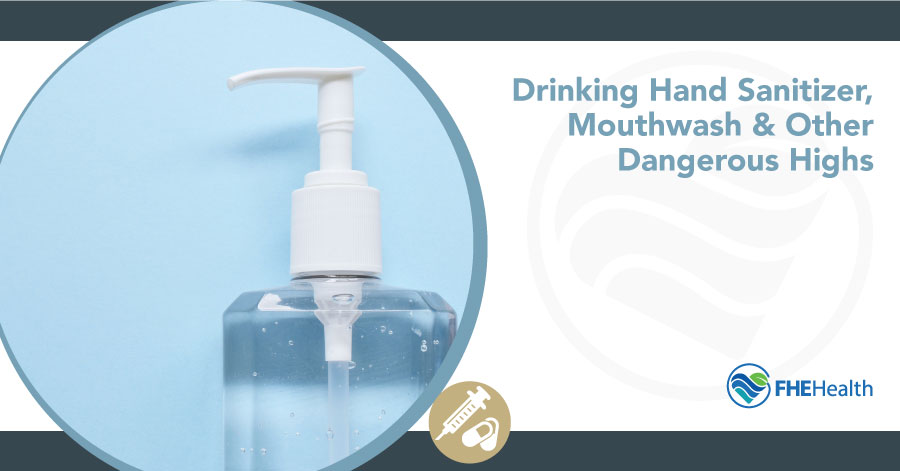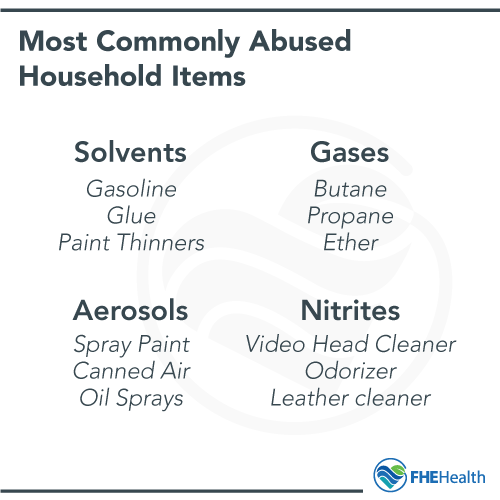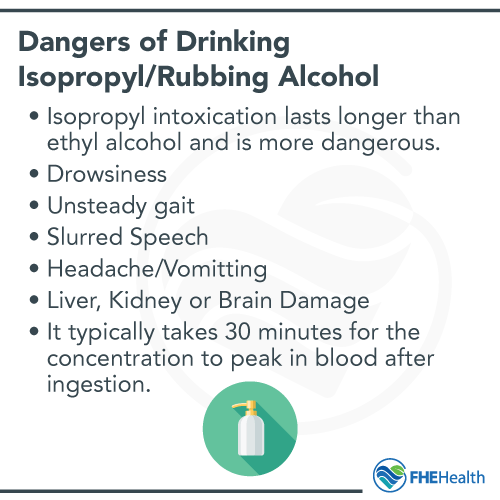
If you’ve heard of people drinking hand sanitizer and mouthwash to get high— it’s no joke. And, while it would seem obvious that misuse of mouthwash and other household products can be dangerous to one’s health, not everyone knows just how much. In reality, drinking hand sanitizer and mouthwash products—as well as other household products—can cause serious long-term injuries and even death in some cases…
Why Hand Sanitizers and Mouthwashes are a Popular “High”
 These products are easily accessible for people looking to get a buzz, which is why they have become popular for not just teens and youngsters but alcoholics and other addicts, too. But just how dangerous are they?
These products are easily accessible for people looking to get a buzz, which is why they have become popular for not just teens and youngsters but alcoholics and other addicts, too. But just how dangerous are they?
In 2015, data from the American Association of Poison Control Centers revealed that there were 1,394 incidents of people intentionally swallowing hand sanitizer, which resulted in two deaths. Here are some reasons why hand sanitizer is so popular:
- The average hand sanitizer bottle contains at least 60 percent alcohol, which is nearly the same as five hard liquor shots.
- People use salt to isolate the alcohol within the sanitizer, which makes it extremely potent. It’s easy to do when instructions are readily available on the Internet.
- Many teens mix it with Listerine to create a stronger “cocktail” concoction.
- Hand sanitizer contains isopropyl alcohol, which is known to cause dangerous health conditions like organ failure, blindness and even death in extreme cases.
- People living on the streets and desperate for alcohol have been found to sometimes make cocktails out of hand sanitizer and mouthwash, which police linked to two deaths in Albuquerque in 2012.
Many experts from across the United States have called on retailers to stop selling hand sanitizer and mouthwash products to people who they think may consume them. The Food and Drug Administration has announced that it is studying the safety of these products and has asked manufacturers to share information about active ingredients present in them, including isopropyl and ethyl alcohol.
The Demographic That Is More Apt to Seek Out “Household Highs”
Hand sanitizer abuse is believed to have started in a New Zealand prison. The prisoners used hand sanitizer to create an alcoholic brew. Three prison inmates at Christchurch’s Rolleston Prison added Raro fruit drink to create and get high on this powerful brew.
Consumption of these household substances tends to be higher among teenagers, addicts and people who find traditional alcohol difficult to obtain.
For example, a 17-year old male was hospitalized for pneumonia and other medical problems. He inserted the hand sanitizer into his feeding tube and became severely ill. He even required dialysis and ventilation for his breathing.
Between two emergency rooms in the San Fernando Valley, six teenagers showed up with alcohol poisoning after consuming hand sanitizer. The incident sparked concerns among health officials regarding a potentially evolving and dangerous trend.
Does It Work to Get High?
But can you really get high from hand sanitizer? Cyrus Rangan, a director at the public health department’s toxicology department in Los Angeles, claimed that it only took a few swallows for a teenager or adult to get drunk on hand sanitizer.
A man in Melbourne, Australia was found to have consumed six bottles of hand sanitizer. This resulted in a blood alcohol level of 0.27 percent, which is more than five times over the legal driving limit of 0.05 percent. The 45-year old man was undergoing treatment for alcoholism when he consumed the sanitizer. Remarkably, the man escaped serious injury and entered rehab to recover from his alcoholism.
In Connecticut, a 36-year old woman was arrested for drinking and driving after drinking hand sanitizer. Police pulled her over on a DUI suspicion after she was spotted driving erratically on the streets. She was thought to have consumed the equivalent of 32 alcohol shots with a blood alcohol reading of 0.17.
While there haven’t been a huge number of deaths from hand sanitizer and mouthwash abuse, these casualties could go up in the absence of public awareness and education. With plenty of distillation details available online, these products are inexpensive and easy for underaged kids and alcoholics to get their hands on.
What does Drinking Hand Sanitizer do? The Dangers of Abuse
 Hand sanitizer contains isopropyl alcohol or rubbing alcohol and ethyl alcohol, which are toxic and can end up making you sick if you consume them directly.
Hand sanitizer contains isopropyl alcohol or rubbing alcohol and ethyl alcohol, which are toxic and can end up making you sick if you consume them directly.
A study of 385 teenagers, ages 13-19, was conducted in Texas. Each of them had ingested hand sanitizer either accidentally or deliberately from 2000 to 2013. The study revealed that about five percent of them suffered from serious medical issues, including abdominal pain, diarrhea, vomiting, drowsiness and nausea.
Drinking hand sanitizer can also result in alcohol poisoning and cause serious issues like comas, low blood sugar and seizures. Other dangerous side effects include organ damage, memory loss, psychological issues and vision problems. In serious cases, hand sanitizer abuse can cause death.
Hand sanitizer is 60 percent alcohol: a potent solution. Some products have a higher concentration of alcohol, which makes them so much worse. Just a few sips can slur one’s speech and lead to organ failure. It can make people drunk enough that they need emergency medical assistance because of the serious health risks involved. It is therefore critically important to understand that drinking hand sanitizer, mouthwash and other household chemicals can cause long-term harm to your health.
Things to Know About the Dangers of Mouthwash and Other Alcohol-Based Household Products
In summary, here are a couple things any parent or family member of an alcoholic should know regarding the dangers of mouthwash and other alcohol-based household products:
- Misused, mouthwash and other alcohol-based household products can be used to get high and can be dangerous because of their high alcohol content. When used as intended, mouthwash can reduce bad breath, gingivitis, plaque, tooth decay and other long-term, dental-related conditions. The problem is that some mouthwash varieties contain a high concentration of alcohol, which can cause people to consume it just to get high. Mouthwashes typically contain 26 percent alcohol, which is much higher than the alcohol content of beer and wine. This is why mouthwash is misused in many instances— at a high risk to users’ health.
- Intoxication is not the only consequence of misusing mouthwash and other alcohol-based household products. Drinking mouthwash can also result in alcohol poisoning and other side effects like diarrhea, stomach pain, vomiting, nausea, drowsiness, dizziness, headaches, low blood pressure, heart rate changes, slurred speech, sore throat, impaired coordination, comas and low body temperature.
When to Get Help
If your child has been using mouthwash or hand sanitizer to get high, it’s possible they may be struggling with an addiction. While some experimentation is normal growing up—especially among teens—sometimes a person may be using hand sanitizer and mouthwash as a form of “drug seeking” (attempts to satisfy cravings for alcohol when booze is not accessible). In this case, the drug-seeking behaviors can be a sign of an alcohol problem that needs treatment. If you’re worried your child may have an alcohol problem, FHE Health is here to help. For a free consultation, you can call us at (866) 653-6220. One of our compassionate and experienced counselors will be happy to assist you.






